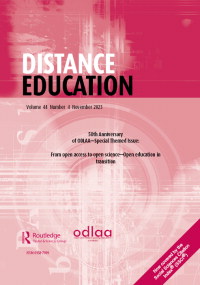Effects of computer-based mind mapping on students' reflection, cognitive presence, and learning outcomes in an online course
IF 3.7
1区 教育学
Q1 EDUCATION & EDUCATIONAL RESEARCH
引用次数: 1
Abstract
Abstract Reflection plays a very important role in the learning process, contributing to improved learning performance and potentially influencing cognitive process. Few studies, however, have used computer-based mind mapping to enhance student reflective activities and examine the relationship between reflection, cognitive presence, and learning outcomes. Therefore, a quasi-experiment was implemented by recruiting students from a big data class at a normal university in central China. The collected data was analyzed by jointly using analysis of covariance, cognitive network analysis, linear regression, and moderating effect analysis. The results were as follows: (a) Students who used computer-based mind mapping performed better on reflection, higher-order cognitive presence, and learning outcomes. (b) The epistemic network analysis showed that students who used computer-based mind mapping had strong connections in higher levels of cognitive presence. (c) Reflection had a positive predictive effect on cognitive presence and learning outcomes, with mind mapping positively moderating the relationship between reflection, cognitive presence, and learning outcomes.基于计算机的思维导图对学生反思、认知存在和在线课程学习成果的影响
摘要反思在学习过程中起着非常重要的作用,有助于提高学习成绩,并可能影响认知过程。然而,很少有研究使用基于计算机的思维导图来增强学生的反思活动,并研究反思、认知存在和学习结果之间的关系。因此,在华中一所师范大学的大数据课堂上进行了一项准实验。通过协方差分析、认知网络分析、线性回归和调节效应分析对收集的数据进行联合分析。结果如下:(a)使用计算机思维导图的学生在反思、高阶认知存在和学习结果方面表现更好。(b) 认知网络分析表明,使用基于计算机的思维导图的学生在更高水平的认知存在中有很强的联系。(c) 反思对认知存在和学习结果具有积极的预测作用,思维导图积极调节反思、认知存在与学习结果之间的关系。
本文章由计算机程序翻译,如有差异,请以英文原文为准。
求助全文
约1分钟内获得全文
求助全文
来源期刊

Distance Education
EDUCATION & EDUCATIONAL RESEARCH-
CiteScore
10.70
自引率
6.80%
发文量
29
期刊介绍:
Distance Education, a peer-reviewed journal affiliated with the Open and Distance Learning Association of Australia, Inc., is dedicated to publishing research and scholarly content in the realm of open, distance, and flexible education. Focusing on the freedom of learners from constraints in time, pace, and place of study, the journal has been a pioneering source in these educational domains. It continues to contribute original and scholarly work, playing a crucial role in advancing knowledge and practice in open and distance learning.
 求助内容:
求助内容: 应助结果提醒方式:
应助结果提醒方式:


